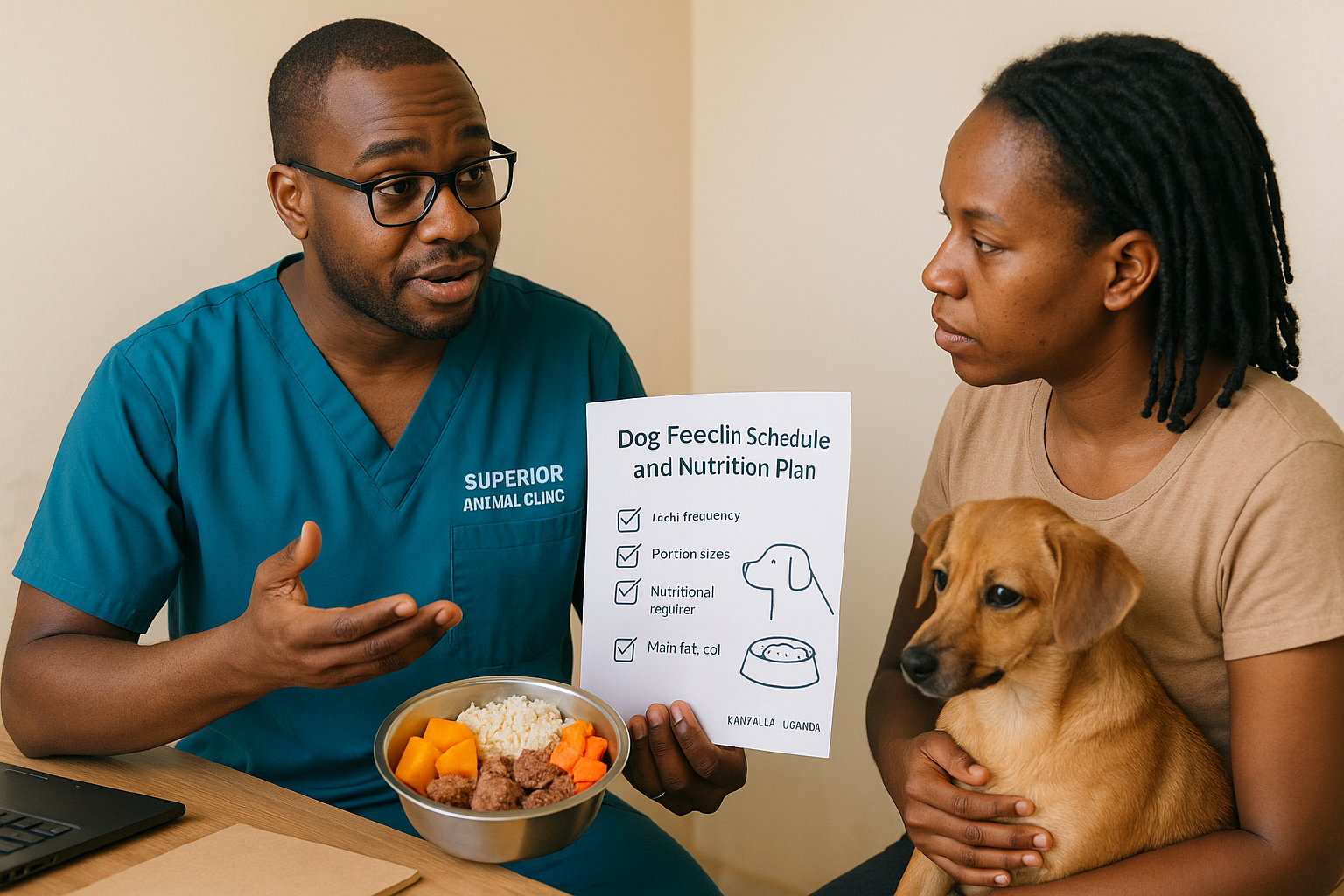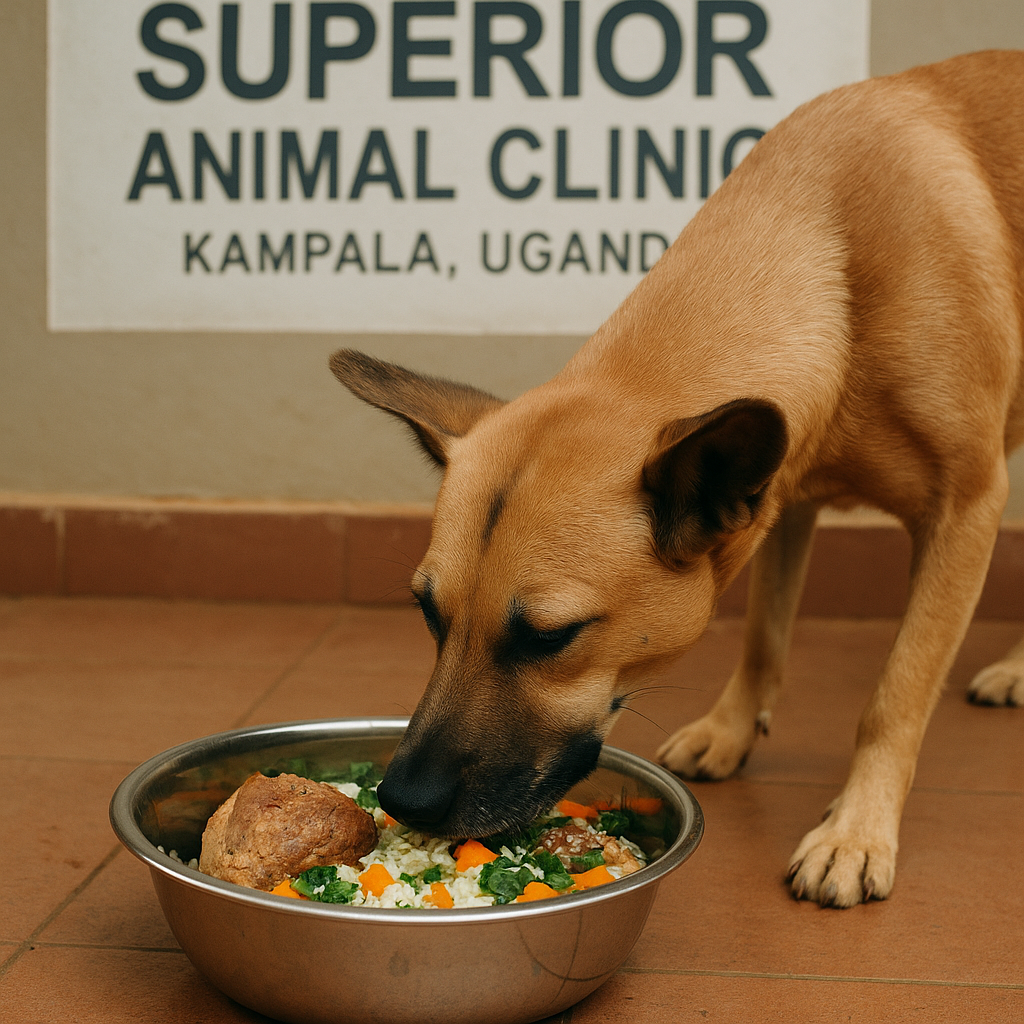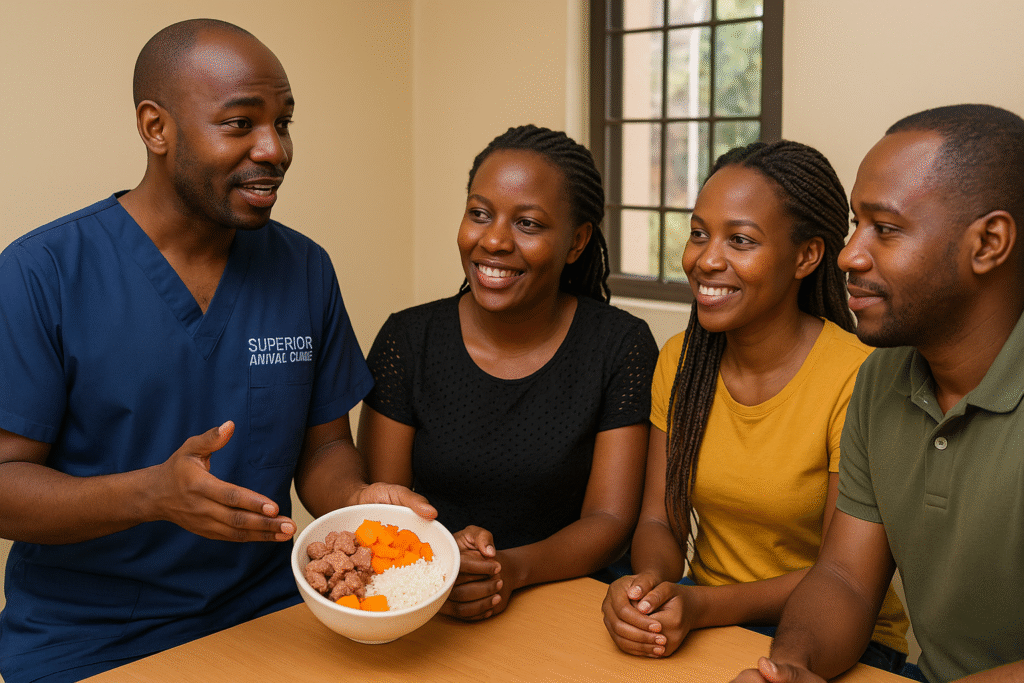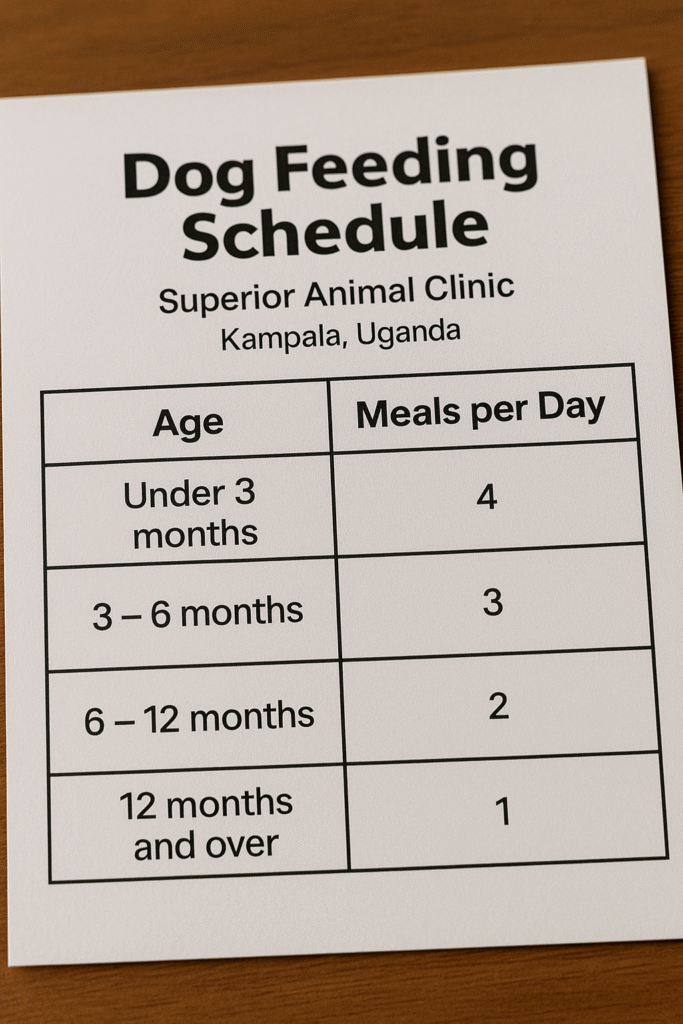
Healthy, balanced, and locally made diets for dogs in Uganda.
On a warm Saturday morning in Kampala, Brian walked into Superior Animal Clinic, visibly worried. His one-year-old German Shepherd, Rocky, had become thin, weak, and had lost his shiny coat. When asked what he was feeding his dog, Brian confidently replied, “Just posho and soup bones—it’s what we eat at home.”
Unfortunately, this is a common story among many loving dog owners across Kampala. While posho (maize flour) is affordable and filling, it lacks the essential nutrients dogs need for muscle growth, energy, and immunity. Dogs, unlike humans, have very specific nutritional requirements that must be met for them to thrive. Feeding them just leftover food or carbohydrates can lead to serious health problems—malnutrition, poor skin, stunted growth, and weakened immunity.
Proper dog nutrition isn’t about expensive imported brands—it’s about balance and understanding what your dog’s body truly needs. With locally available Ugandan foods such as rice, pumpkin, eggs, liver, vegetables, and chicken, any dog owner can prepare affordable, nutritious, and tasty meals at home.
This article breaks down everything you need to know about dog nutrition in Kampala, Uganda—from homemade meal recipes using local ingredients, to a practical feeding schedule for puppies and adult dogs, special diets for dogs with medical conditions, and even foods that are poisonous to dogs in Uganda. You’ll also learn where to buy the best affordable ingredients in Kampala and the current market prices.
Let’s dive in and learn how you can keep your dog strong, healthy, and happy—without breaking the bank.
🥩 Why Dog Nutrition Matters
Good nutrition is the foundation of your dog’s health — it supports energy, growth, strong immunity, healthy skin, shiny coat, and long life. Dogs in Kampala can thrive on homemade meals prepared with safe, locally available ingredients if those meals are well-balanced and portioned correctly for age and size.
At Superior Animal Clinic, Makindye, we guide pet owners across Kampala on the right nutrition plans for every stage of their dog’s life — from playful puppies to calm seniors.
🥦 Best Locally Available Ingredients for Homemade Dog Food in Uganda
Here are healthy and safe options found in Kampala markets:
🥔 Energy Sources (Carbohydrates)
- Matooke (green banana/plantain): easy to digest and rich in fiber and potassium.
- Sweet potato: provides energy, vitamins A and C, and fiber.
- Irish potato: great carb source when boiled (not fried).
- Pumpkin: low-calorie filler rich in beta-carotene and great for digestion.
- Oats or brown rice: good options for dogs that tolerate grains well.
🍗 Protein Sources
- Chicken (boiled and deboned): lean, rich in amino acids.
- Beef (lean): builds muscle and strength.
- Fish (tilapia or Nile perch): rich in omega oils for coat and skin health.
- Eggs (cooked): complete protein, easy to digest.
- Beans, cowpeas, groundnuts: plant-based proteins (should be well-cooked and used moderately).
🥕 Vegetables & Extras
- Carrots, pumpkin, spinach, sukuma wiki (kale): rich in vitamins and minerals.
- Vegetable oil (e.g., sunflower or groundnut oil): small amounts improve coat shine.
- Calcium supplement (vet-recommended): necessary for bone growth, especially in puppies.
🍽️ Five Practical Homemade Dog Food Recipes Using Local Foods
All meals should be cooked, unsalted, and free of onions, garlic, and spices.
1️⃣ Matooke & Chicken Delight
- 1 kg matooke (boiled and mashed)
- 500 g boiled chicken (boneless, shredded)
- 200 g pumpkin and carrots (cooked and mashed)
- 1 boiled egg
Mix and portion for the day.
2️⃣ Sweet Potato & Beef Mix
- 1 kg boiled sweet potatoes (mashed)
- 600 g lean beef (boiled and minced)
- 200 g spinach or kale (lightly steamed and chopped)
- 1 tablespoon sunflower oil
3️⃣ Fish & Irish Potato Combo
- 700 g Nile perch or tilapia (boiled, deboned)
- 700 g Irish potatoes (boiled and mashed)
- 200 g pumpkin or carrot (boiled)
Great for dogs with dry skin or itchy coats.
4️⃣ Protein-Boost Meal (for Puppies or Lactating Dogs)
- 500 g chicken or beef (boiled)
- 2 boiled eggs
- 300 g cooked beans or cowpeas (soft)
- 300 g sweet potatoes (mashed)
Add calcium supplement as advised by your vet.
5️⃣ Vegetable Energy Bowl
- 1 kg matooke (mashed)
- 200 g beans (boiled and mashed)
- 200 g vegetables (pumpkin, carrots, spinach)
- 1 egg
Suitable for overweight or less active dogs.

🕒 Feeding Guide & Schedule for Dogs at Different Ages
| Age / Stage | Meals per Day | Example for Medium Dog (15 kg adult) |
|---|---|---|
| 2–3 months | 4 meals | About 250 g per meal |
| 4–6 months | 3 meals | About 200–267 g per meal |
| 6–12 months | 2–3 meals | About 375–450 g per day (split evenly) |
| Adult (1–7 yrs) | 1–2 meals | About 300–450 g per day (split evenly) |
| Senior (8+ yrs) | 1–2 smaller meals | About 300 g per day |
💡 Tip: Always adjust portions based on your dog’s activity level, breed, and body condition.
Active or underweight dogs may need a bit more, while overweight dogs should have slightly smaller portions.
🐶 Dogs with Special Dietary Needs & Practical Feeding Advice
🔹 Overweight Dogs
Feed 1.5–2% of body weight per day.
Focus on lean meat (chicken/fish), boiled vegetables (pumpkin, carrots, spinach), and low-fat ingredients. Avoid oil, fatty beef, and fried foods.
🔹 Pregnant or Nursing Dogs
Energy needs increase by 30–100%.
Feed 3–4 smaller meals with plenty of protein (chicken, eggs, fish) and calcium supplement.
Use “Protein-Boost Meal” recipe.
🔹 Puppies (Weaning to 6 Months)
Feed 4–3 times daily using soft, mashed foods rich in protein and energy — like chicken, eggs, sweet potato, and matooke. Avoid bones and hard kibble.
🔹 Senior Dogs
Feed easily digestible, lower-fat meals — like boiled fish + pumpkin + rice or matooke.
Include joint support foods (fish oil, boiled egg) and always provide fresh water.
☠️ Foods That Are Poisonous to Dogs in Uganda
| Toxic Food | Why It’s Dangerous |
| Chocolate & Cocoa | Contains theobromine — affects heart & nerves. |
| Onions, Garlic, Leeks | Cause red blood cell destruction → anaemia. |
| Grapes & Raisins | Can cause kidney failure. |
| Xylitol (sweetener) | Causes low blood sugar & liver failure. |
| Cooked Bones | Splinter → choke or internal injury. |
| Avocado (large amount) | Persin toxin & excess fat cause vomiting. |
| Alcohol & Caffeine | Toxic to heart and nervous system. |
| Fatty Scraps | Risk of pancreatitis. |
If your dog eats any of these, contact our vet immediately — you can reach Superior Animal Clinic in Makindye for emergency advice.
🛒 Where to Buy Dog Food Ingredients in Kampala & Typical Prices
| Ingredient | Average Price (UGX) | Common Markets |
| Chicken (boneless) | 11,000–26,000/kg | Kalerwe, Nakasero, Quality supermarkets |
| Beef (lean) | 11,000–23,000/kg | Owino, Nakasero, Kibuye markets |
| Tilapia / Nile Perch | 12,000–18,000/kg | Kalerwe, Ggaba Fish Market |
| Eggs | 10,000–30,000 per tray | Owino, local shops, SR Kuku |
| Matooke | 35,000–50,000 per bunch | Kalerwe, Nakawa, Wandegeya |
| Sweet Potato | 1,500–3,000/kg | Kalerwe, Owino, Bwaise |
| Vegetables (pumpkin, carrots, greens) | 2,000–5,000/kg | Any fresh produce market |
💡 Tip: Buy fresh meat and vegetables in the morning. Boil and refrigerate portions for 3–4 days maximum. Freeze extra food to reduce waste.
🧼 Hygiene and Storage Tips
- Always wash ingredients thoroughly before cooking.
- Cook all meats to avoid parasites and bacteria.
- Avoid feeding leftovers that have been sitting unrefrigerated.
- Use stainless steel bowls, not plastic ones.
- Always provide clean, fresh water daily.
Dog Quick Feeding Chart in Uganda
| Dog Size | Daily Amount (Cooked Food) | Meals per Day |
| Small (7 kg) | 150–210 g | 2 |
| Medium (15 kg) | 300–450 g | 2 |
| Large (30 kg) | 600–900 g | 2 |
🐶 FAQs About Dog Nutrition in Kampala, Uganda
1. What is the best food to feed my dog in Kampala, Uganda?
The best dog food in Kampala includes a mix of boiled rice, chicken, beef, liver, eggs, vegetables like pumpkin and carrots, and silverfish (mukene). These locally available foods provide proteins, vitamins, and minerals your dog needs for strength and immunity.
2. Can I feed my dog leftover human food?
It’s not recommended to rely solely on leftovers. Many Ugandan foods—like spiced stews, onions, or salt-heavy sauces—can upset your dog’s stomach or cause poisoning. Always prepare plain, dog-safe meals without salt, chili, or oil.
3. What are some homemade dog food recipes using Ugandan ingredients?
You can prepare a simple meal using boiled rice, chicken, pumpkin, carrots, and eggs. Mix them well to create a balanced, nutritious meal suitable for most dogs.
4. How many times should I feed my puppy in Kampala?
- 2–3 months: 4 meals per day
- 4–6 months: 3 meals per day
- 6–12 months: 2 meals per day
As your puppy grows, gradually reduce the frequency but increase the portion size.
5. What is the best diet for an adult dog in Uganda?
Adult dogs thrive on two balanced meals daily—morning and evening—made from rice or boiled sweet potatoes, meat or mukene, and vegetables like pumpkin and carrots.
6. How much food should I feed my dog per day?
On average:
- Small breeds (5–10 kg): 1–1.5 cups of cooked food daily
- Medium breeds (10–25 kg): 2–3 cups daily
- Large breeds (25–40+ kg): 4–5 cups daily
Adjust based on your dog’s activity level and age.
7. Which dogs need special dietary care in Uganda?
Dogs with kidney disease, obesity, diabetes, liver disease, or allergies require specialized diets. For instance, dogs with kidney issues need low-protein, low-sodium meals like boiled rice and pumpkin, while diabetic dogs benefit from high-fiber diets like vegetables and lean meat.
8. Can I use maize flour (posho) in my dog’s food?
No. At Superior Animal Clinic, we do not recommend maize flour (posho) because it offers poor nutritional value for dogs and can cause bloating or allergies in some breeds. Choose rice, potatoes, or pumpkin instead.
9. What foods are poisonous to dogs in Uganda?
Avoid feeding dogs onions, garlic, avocado, chocolate, grapes, alcohol, raw beans, and foods seasoned with salt or chili. These cause vomiting, diarrhea, or organ damage. Always keep leftovers and human snacks away from dogs.
10. Where can I buy affordable dog food ingredients in Kampala?
You can find most ingredients from:
- Kalerwe Market: Fresh pumpkin, carrots, mukene, and eggs (UGX 2,000–5,000 per portion)
- Nakawa Market: Fresh meats, vegetables, and rice (UGX 5,000–10,000 per kg)
- Shoprite or Capital Shoppers: Quality dry dog foods and supplements
- Superior Animal Clinic (Makindye): Nutritional guidance and prescription diets
11. What is the price of locally made dog food in Kampala?
Homemade meals cost about UGX 5,000–8,000 per day depending on your dog’s size and the ingredients used—much cheaper than imported brands that cost UGX 80,000–200,000 per bag.
12. How can I tell if my dog is malnourished?
Look out for symptoms such as visible ribs, dry skin, dull coat, weakness, and loss of appetite. If you notice these signs, visit Superior Animal Clinic in Makindye for a nutritional assessment and feeding plan.
13. Should I give my dog supplements in Uganda?
Yes—especially if your dog eats mostly homemade food. Omega-3, calcium, and multivitamin supplements (available at vet clinics like Superior Animal Clinic) help maintain healthy joints, bones, and skin.
14. Can I feed my dog raw meat in Uganda?
It’s not recommended due to the risk of bacterial infections like Salmonella or E. coli. Always cook meat thoroughly before feeding it to your dog.
15. What is the best food for senior or old dogs in Uganda?
Older dogs (7+ years) need soft, easily digestible meals rich in fiber and lean protein—like boiled chicken, rice, pumpkin, and carrots. Feed them twice daily in smaller portions.
16. Are dog treats necessary?
Yes, but keep them healthy. You can make local treats from boiled liver cubes, small bits of cooked chicken, or baked sweet potato. Avoid sugary or salty snacks.
17. What is the best vet clinic for dog nutrition advice in Kampala?
Superior Animal Clinic, located in Makindye along Salaama Road, is one of the best veterinary hospitals in Kampala for personalized dog nutrition guidance and affordable dietary plans.

18. Do large breed dogs in Uganda need different diets from small breeds?
Yes. Large breeds like German Shepherds or Rottweilers require more protein and calcium for muscle and bone strength, while smaller breeds like Maltese or Pomeranians need calorie-dense but lighter portions to prevent obesity.
19. How can I transition my dog from imported kibble to local homemade food?
Gradually mix small amounts of homemade food with kibble over 7–10 days to avoid stomach upsets. Increase the homemade portion daily until your dog fully adjusts.
20. What’s the best vet hospital in Kampala for dogs with special dietary needs?
Superior Animal Clinic in Makindye, Kampala offers customized diet plans for dogs with obesity, kidney failure, diabetes, or liver disease, ensuring your pet receives balanced, condition-specific nutrition.
21. What are the signs that my dog’s current diet is not suitable?
If your dog frequently has diarrhea, constipation, itchy skin, dull fur, bad breath, or reduced energy, the current diet may not meet its nutritional needs. Visit Superior Animal Clinic in Makindye for a professional diet review and adjustment plan.
22. Can dogs eat matoke or bananas in Uganda?
Yes, but only in small amounts. Bananas are rich in potassium and fiber, making them a healthy treat. However, avoid feeding cooked matoke mixed with oil or salt—it’s too starchy and not ideal for daily feeding.
23. Are beans safe for dogs in Uganda?
Yes, boiled beans can be a good source of protein and fiber when fed in moderation. Avoid raw beans—they contain toxins that can upset your dog’s stomach. Always boil them thoroughly and mix with vegetables or meat.
24. Is mukene (silverfish) good for dogs?
Absolutely! Mukene is one of the best and most affordable sources of protein, omega-3, and calcium for dogs in Uganda. It promotes strong bones, shiny coats, and muscle growth. Always cook or sun-dry it before feeding. But if properly stored, it accumulates a lot of aflatoxins
25. How much should I spend on dog feeding per month in Kampala?
Depending on your dog’s size and diet, expect to spend between UGX 150,000–300,000 per month on homemade meals using rice, chicken, mukene, eggs, and vegetables.
26. Can I feed my dog sweet potatoes or Irish potatoes?
Yes! Boiled sweet potatoes and Irish potatoes are excellent carbohydrate sources that provide energy and are easier to digest than posho or bread. Avoid adding salt or oil.
27. What vegetables can dogs safely eat in Uganda?
Dogs can safely eat boiled pumpkin, carrots, green beans, spinach, peas, and broccoli. These boost immunity and improve digestion. Always cook vegetables lightly before serving.
28. Are fruits good for dogs in Uganda?
Yes, but only certain fruits like watermelon, pawpaw, apples (without seeds), bananas, and mangoes in small portions. Avoid grapes and avocados—they are toxic to dogs.
29. Can dogs drink milk in Uganda?
Some adult dogs are lactose intolerant and may develop diarrhea after drinking milk. If your dog tolerates it well, small amounts of unsweetened milk or plain yogurt are fine occasionally.
30. How can I make my dog’s coat shiny and healthy?
Feed foods rich in Omega-3 and protein, such as mukene, liver, eggs, and a few drops of fish oil. Regular grooming and hydration also help maintain a glossy coat.
31. Can I use fish as the main protein source for my dog in Uganda?
Yes, fish such as tilapia, Nile perch, or mukene are great protein options. Always remove bones and cook thoroughly to prevent choking or infections.
32. What should I feed a pregnant or nursing dog in Kampala?
Pregnant and nursing dogs need high-protein, high-calorie diets. Feed them 3–4 times daily with boiled chicken, liver, rice, mukene, eggs, and pumpkin. Add calcium supplements after veterinary consultation.
33. How much water should my dog drink daily?
Dogs should drink about 50–100 ml of water per kg of body weight per day. Always ensure clean, fresh water is available—especially during hot Kampala days.
34. Can dogs eat chapati, bread, or rolex?
No. These foods are high in gluten, oil, and salt, which can cause obesity and digestive issues in dogs. Instead, offer plain boiled carbohydrates like rice or sweet potatoes.
35. What’s the best diet for active or working dogs in Uganda?
Working dogs like security or hunting dogs need high-energy meals rich in protein and fat—such as boiled rice or potatoes mixed with beef, mukene, or eggs—fed twice or thrice daily.

36. Can I feed my dog raw vegetables or should I cook them?
Lightly boiled vegetables are best because raw vegetables are harder to digest. Cooking helps dogs absorb nutrients better and prevents gas or bloating.
37. How can I help an overweight dog lose weight safely?
Reduce high-carb foods, feed smaller portions, and include lean proteins like chicken, mukene, or eggs. Increase exercise, such as daily walks or play sessions. For a safe plan, consult Superior Animal Clinic in Makindye.
38. What should I feed a sick or recovering dog in Uganda?
Offer soft, bland meals like boiled rice with chicken or pumpkin, served warm in small portions. Avoid oil, salt, or spices. Your vet may recommend recovery diets or supplements.
39. What are the most common dog feeding mistakes Ugandan owners make?
- Feeding posho or leftovers daily
- Giving spicy or oily food
- Not providing clean water
- Feeding irregularly or skipping meals
- Not balancing protein, carbs, and vegetables
40. Where can I get professional dog nutrition advice in Kampala?
You can visit Superior Animal Clinic, located along Salaama Road in Makindye, Kampala. The clinic offers customized feeding plans, weight management programs, and medical diets tailored to your dog’s health and lifestyle.
✳️ Final Takeaway
Feeding your dog in Kampala doesn’t have to be expensive or complicated. With locally available foods like matooke, sweet potatoes, beef, chicken, eggs, and fish — you can prepare balanced, healthy meals that keep your pet active and happy.
For personalized feeding plans or special diet consultations, visit Superior Animal Clinic, Makindye — the trusted vet hospital for dog nutrition and diet care in Kampala.

Philwin, huh? I’ve been playing around on this site recently, and it’s not bad at all! Good payouts and the game variety keeps things interesting. Definitely recommend giving philwin a shot!
Thanks for sharing. I read many of your blog posts, cool, your blog is very good.